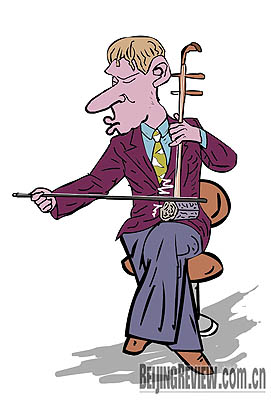|

My pal Damon McMahon must have been born with a golden tongue, amazing ears and an acoustic guitar in his right hand, an electric in his left. This young, amiable and highly talented musician, born in 1980 in Philadelphia, schooled in Connecticut and feted for his musical abilities by the highly competitive New York music crowd, has been professionally making music since 2001. His band INOUK immediately cut a record with Say Hey. In 2003, he put out a solo record with Astralwerks and then another under the EMI label. Then in 2007, McMahon got off the NY music scene's hamster wheel--he packed up and moved to Beijing after Modern Sky, a Chinese-owned cultural media outlet, offered him a job.
I'd studied Chinese at Swarthmore," McMahon said. "So I've always been interested in China. The company I'm with is the biggest independent rock and roll source in China. I thought this would be a great opportunity for me not only to broaden my horizons but also to partner with them, create my own label and release Western experimental music as well as market good contemporary Chinese music."
McMahon conceded that he was more of an artist than a businessman, mentioning that he's just been signed to another American label, Locust Music, and that they want him back in the United States in the winter to promote his new album.
"I'd like to stay till the fall of ‘09," he said. "But I also miss playing shows and touring. And unfortunately, in the record industry you need to promote yourself and latch onto the slightest momentum or people will forget you."
Beijing constantly lures many different kinds of foreigners. All of them are enhancing the city's already formidable tastes in art, food, literature and music. Personal investigations indicate that most expats prefer traditional Chinese music to almost everything else. One handsome Scot, David Ferguson, even said he heads for parks to listen to the old folks play and croons along to their melodies despite the language difference. Some expats appreciate famous local pop singers but most have little affinity toward Asian pop. It's more than just a language barrier. McMahon echoed the sentiments of many foreigners when he remarked, that he doesn't really enjoy Chinese pop. "It's a little too saccharine for my tastes, though I don't really know much about it, I'm interested in more traditional Chinese music, like Peking Opera. I'm learning to play the erhu as well," he said.
Apparently good rock bands in China are hard to find. "Well, to be totally honest I think that there is only a small handful of good rock bands in China. Part of the reason is that Chinese youth haven't had enough opportunities to be exposed to rock music's history and haven't had much of a foundation to build on, so the output, at least at this point, is a bit limited," McMahon said.
But the recent use of music to vent irate feelings regarding CNN indicates that Chinese musicians do take stances using their music. The normal love lyrics of Chinese pop recently gave way to public displeasure over a CNN anchorman's ill spoken words regarding China. "I don't know if the lyrics are great art," a young European commented. "But blacks in the U.S. used jazz to express their feelings--political and otherwise. Creative people around the world respond to things that move them; some of the results are better than others."
Recently Western rock and roll bands and music have started inundating China and the Internet is an enormous resource. "Before the Internet China received only back stocks, and local record stores with great selections were rare," McMahon said. "Musicians need other artists to use as sounding boards; they have to listen to music and learn--they evolve and learn and innovate from each other. It's not usually a solitary process."
Western musicians recognize China's superstar of rock: Cui Jian as forward-looking, trendy and conscious of contemporary Western rock. Interestingly, Chinese women are also playing a prominent role in rock and roll, especially in Beijing.
Why do foreigners like Peking Opera and traditional instruments? "Some melodies have got this sense of being mournful and full of longing, it's something like Appalachian music; these kinds of melodies and rhythms are really global," McMahon explained. Interestingly, many of my Chinese colleagues are also avid fans of traditional instrumental music, preferring it to pop and Western classical music.
"Even if I don't understand Chinese well," John, a British expat remarked. "I can feel the power and beauty of this culture through the music. That's part of being human. Good music crosses all political, social and cultural boundaries."
The author is an American working in Beijing |